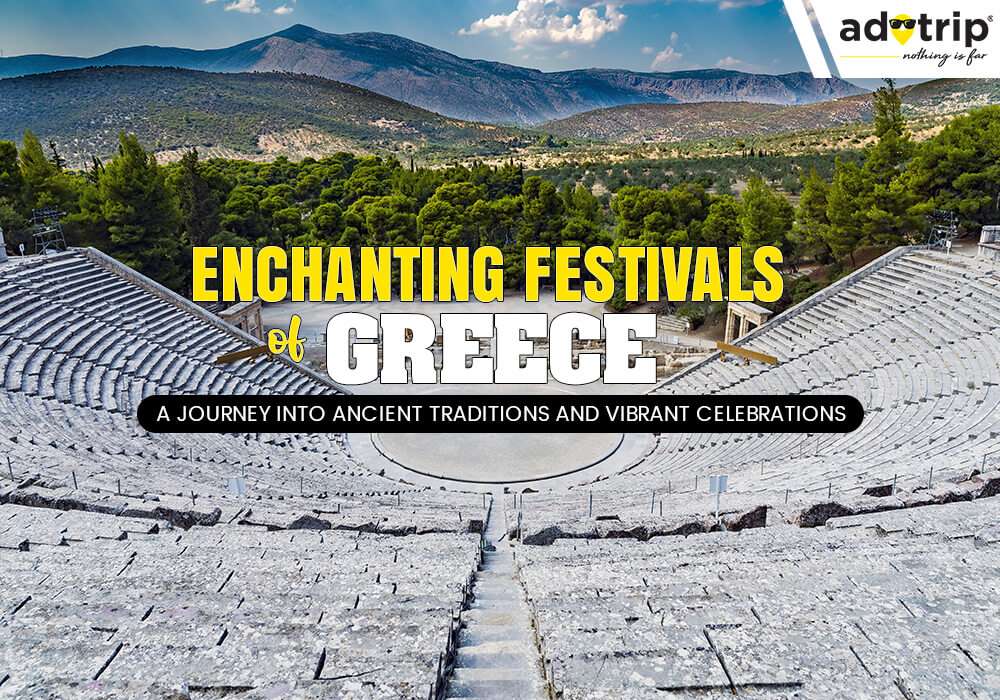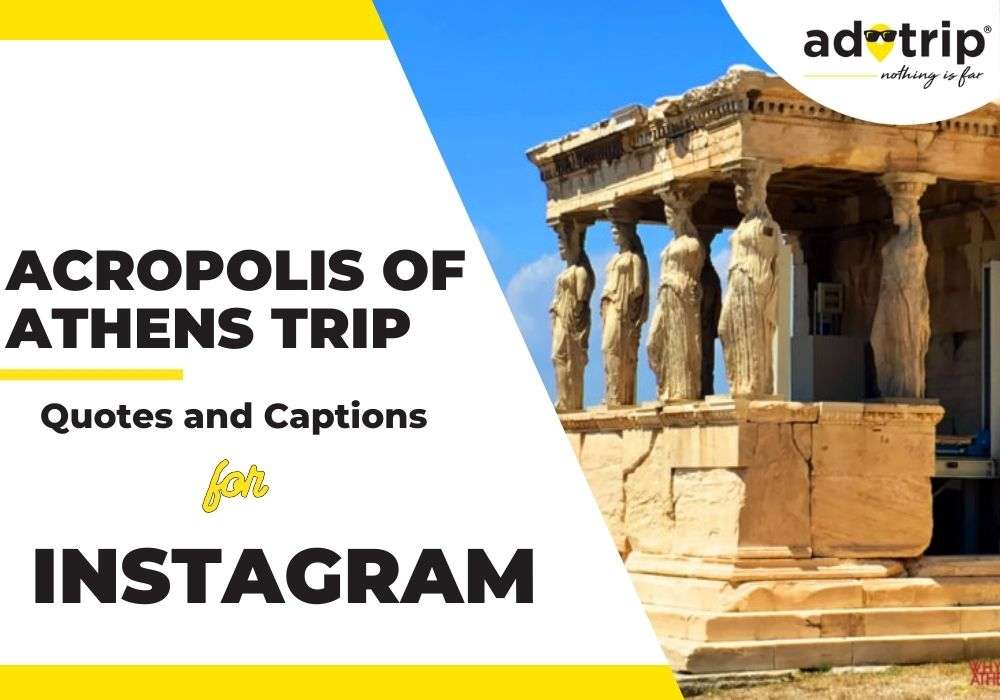
Last Updated At: 12-Dec-2023
15 Facts About Greece You Didn't Know
Greece, a mesmerising Mediterranean nation in southeast Europe, is known for its beautiful scenery, rich Greece's history, and cultural legacy. Greece, known as the cradle of democracy and classical philosophy, offers a perfect fusion of historical sites and contemporary life. The Acropolis and Parthenon, two of its well-known landmarks, serve as reminders of its legendary past. Greece offers stunning beaches, endearing islands, and clear waters along its coastline over the Aegean, Ionian, and Mediterranean Seas. Greece continues to wow tourists with its ageless allure, from its wonderful cuisine to its colourful culture.
List Of 15 Famous Facts About Greece
The birthplace of Western civilisation is Greece. The origin of democracy, theatre, the Olympics, and many others. Greece is well-known today for its rich history, delectable cuisine, and stunning island landscapes. But there are a few things you ought to know. These Greek facts will enthral your friends and teach you more about this fascinating nation.
1.Thousands of islands make up Greece
The Aegean and Ionian Seas are home to thousands of islands that make up Greece. These islands range in size and character, offering a variety of topographies, civilisations, and pasts. Each island in Greece contributes to the rich tapestry of experiences, from the renowned Santorini with its breathtaking sunsets to the historic Crete and the energetic nightlife of Mykonos.
2. Greece is home to 18 UNESCO World Heritage Sites
With 18 UNESCO World History Sites, Greece can display its immense cultural and historical history. These locations include, among others, the well-known Acropolis of Athens, the historic sites at Delphi, the mediaeval city of Rhodes, and the monasteries at Meteora. Each site contributes to the historical importance of Greece by preserving specific elements of its past.
3. Mountains make up nearly 80% of Greece
Greece's geography is dominated by mountains, which comprise around 80% of the surface. Numerous mountain ranges, including the Pindus, Taygetos, and Olympus, contribute to the nation's rocky landscape. The history and culture of Greece have been significantly shaped by these peaks, which have impacted everything from local towns and traditions to ancient Greek mythology.
4. There is a place in Greece at most 137 kilometres from the sea
Greece's close relationship with its shoreline is highlighted because no place is more than 137 kilometres from the sea. Greece's maritime history, trade, and culture have been strongly influenced by its proximity to the Aegean, Ionian, and Mediterranean Seas. The water has influenced everything from cuisine to transportation, constituting a significant component of Greek identity.
5. Greece is home to a wide variety of wildlife
Greece's diversified ecosystems sustain various species, making it home to various animals. Greece's natural diversity supports a distinctive and essential home for various plant and animal species, including the elusive brown bear in the Pindus mountains, loggerhead sea turtles reproduction on its coastlines, and the endangered European mouflon in its forests.
6. Each year, numerous tourists come to Greece than its entire population
Due to its attractiveness, Greece attracts more tourists each year than its entire population. Greek residents number roughly 10 million, but over 30 million tourists visit yearly to take in the country's magnificent scenery, historical landmarks, and charming islands. The prosperous tourist sector has a major impact on the economy and popularity of the nation.
7. Greece's capital carries the goddess Athena's name
Athena, an ancient goddess, receives recognition in the name of Greece's capital city. Athena, known as the goddess of knowledge, bravery, and civilisation, occupies a significant position in Greek mythology. Her memory is honoured by the Acropolis in Athens, which carries her name and has a long history and cultural heritage.
8. The third-largest producer of olives is Greece
Greece is delighted to be the world's third-largest producer of olives. This Mediterranean country's perfect temperature and geography promote ideal olive production conditions. Greece, which has a long history of cultivating olives, contributes substantially to the production of olive oil and exhibits the crop's cultural value through its culinary customs and economic influence.
Read More: Best Beaches in Greece
9. No other city in the world has as many theatres as Athens has
As a city with an unmatched plethora of theatres, Athens stands out. No other city can compare to its many performance areas, each reflecting Greece's illustrious theatrical past. To uphold its reputation as the cradle of drama and performance, Athens remains a major international centre for artistic expression, from the landmark ancient theatre of Epidaurus to modern stages.
10. In Greece, there are more than 4,000 traditional dances
Greece has an astounding collection of nearly 4,000 traditional dances, each steeped in local history and culture. These dances commemorate various events, including weddings and harvest festivals, and they do it by telling emotions and stories through complex movements. The dances often include regional dress and customs, creating a colourful tapestry of Greece's rich heritage and strengthening a sense of community.
11. One of the world's sunniest spots
The Greek island of Rhodes stands out as one of the sunniest places on Earth due to its ample sunshine. With more than 300 days of sunshine each year, Rhodes has a Mediterranean environment that draws tourists with its comfortable warmth. This outstanding location enchants travellers with its breathtaking vistas, illustrious past, and dynamic culture.
12. Greece is the nation with the most museums dedicated to archaeology
Greece is pleased to claim the record for having the most museums devoted to archaeology. These establishments provide an enthralling tour of the nation's rich historical and cultural legacy by displaying items from past civilisations. Greece's commitment to preserving and sharing its archaeological affluence, from the National Archaeological Museum in Athens to smaller regional museums, underlines its lasting significance as a centre of history.
13. It has another name
There is a historical and informal term for Greece, also known officially as the Hellenic Republic. It was known in ancient times as "Hellas," a name connected to the Greek civilisation and culture that served as the basis for Western ideas and democracy. This dual identity, embodied by "Greece" and "Hellas," reflects the country's significant historical past and continuing legacies.
14. One of the oldest languages currently in use is Greek
One of the oldest languages still spoken today is Greek. With a continuous language heritage spanning thousands of years, its roots can be found in antiquity. The use of language has been crucial in philosophy, science, and literature. The continuity of modern Greek with its historical roots offers an intriguing window into the development of human communication.
15. Greeks enjoy dancing
Greeks enjoy dancing greatly and consider it an essential aspect of their culture. Dancing is a vivid way for people to show their spirit and sense of community, whether it is through traditional folk dances performed at festivals in Greece or modern routines in vivacious nightclubs. Greece has a deep-seated love of celebration, music, and shared experiences, and this love of dance reflects that.
Read More: Places to Visit in Greece
Adotrip is a fantastic choice for a travel partner while planning a trip to Greece if you want to have an affordable and enjoyable vacation. Adotrip offers thorough travel guides, skillfully designed itineraries, and local expertise to enhance your travel experience. Discover fascinating information about Greece. Utilise Adotrip's assistance as you quickly and easily enjoy top tourist attractions in Greece.
With us, nothing is far!
Book Greece Tour Packages
Frequently Asked Questions About Facts About Greece
Q1. What are some ancient Greek historical achievements and contributions?
A1. In the fields of philosophy, mathematics, democracy, architecture, and literature, the ancient Greeks made enormous contributions. Epic writings like the Iliad and works by Socrates and Euclid are among their legacies, as well as the Parthenon.
Q2. How does Greece's geography and landscape impact its culture and lifestyle?
A2. Greece's mountainous and island topography impacted trade, communication, and settlement patterns. This shaped Greek lifestyle and traditions by fostering regional identities, marine traditions, and distinctive cultural activities.
Q3. What are some popular Greek mythology stories and figures?
A3. Famous stories from Greek mythology include those about Zeus, Hera, Poseidon, Athena, Apollo, and Artemis. The Trojan War and the hero narratives of Hercules, Perseus, and Theseus are also well-known.
Q4. How is Greek cuisine distinct and celebrated globally?
A4. Fresh ingredients, olive oil, herbs, and Mediterranean flavours define Greek food. Internationally renowned dishes like moussaka, souvlaki, and baklava highlight the nation's extensive culinary history.
Q5. What are some famous Greek islands and their attractions?
A5. The white-washed structures and breathtaking sunsets of Santorini are well known. Ancient sites like Knossos and lovely beaches can be found in Crete. While Rhodes is famed for its history and mediaeval architecture, Mykonos is renowned for its thriving nightlife.
Q6. What is the significance of ancient Greek architecture?
A6. The influence of ancient Greek architecture on modern architecture gives it such lasting significance. The Doric, Ionic, and Corinthian orders and developments like the Parthenon continue to influence architectural ideas and aesthetics today.
Q7. How has Greece's economy evolved?
A7. When Ottoman power came to Greece, the economy transformed from ancient trade to modern commerce. It encountered difficulties in the modern era, including debt crises that impacted the shipping, tourism, and service industries.
Q8. What are some traditional Greek dances and music forms?
A8. The vivacious Syrtos and the Kalamatianos circle dance are examples of traditional Greek dances. The vibrant cultural diversity of the country is reflected in the music, which frequently incorporates impassioned vocals and instruments like the bouzouki and baglama.
Q9. How does Greece celebrate its religious festivals and holidays?
A9. Greece observes religious holidays fervently. Easter is a big holiday with religious services, candlelight processions, and joyful meals. Epiphany and Christmas are two more holidays with significant religious and cultural significance.
Q10. What are some modern Greek cultural influences on the world?
A10. Through Nobel laureates like Seferis, modern Greek culture has influenced literature. Filmmakers like Angelopoulos became well-known worldwide. Greek philosophy, gastronomy, and sports, particularly the Olympics, continue to impact culture worldwide.
--- Published By Adotrip
Latest Blogs

Long Weekends In India 2025 - List of Holidays

Kazakhstan Travel Guide 2025: Affordable Luxury, Visa Free E...

Think Ayodhya is Just Temples? Discover Its Hidden Artistic...

Why Azerbaijan is the Best Budget Friendly Alternative to Sw...











.jpg)

 Dubai
Dubai Malaysia
Malaysia USA
USA





